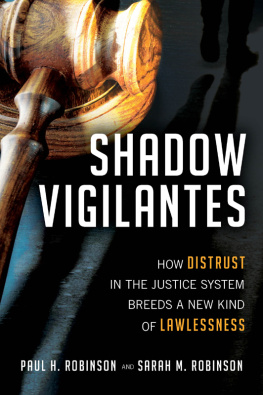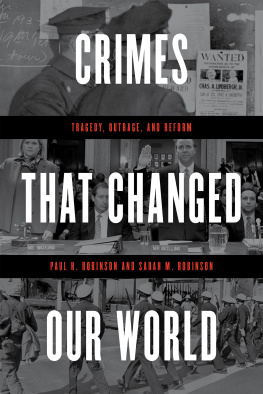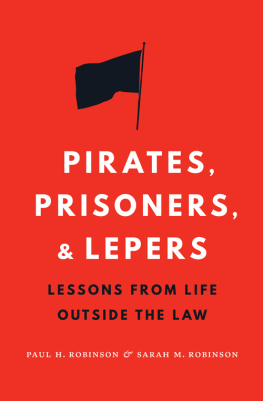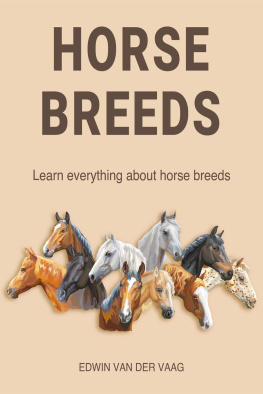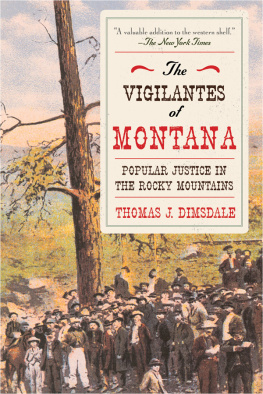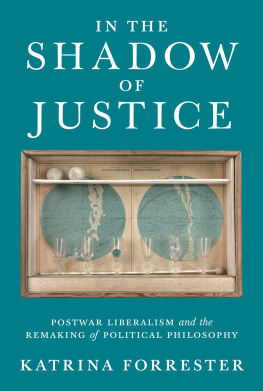Paul H. Robinson - Shadow Vigilantes: How Distrust in the Justice System Breeds a New Kind of Lawlessness
Here you can read online Paul H. Robinson - Shadow Vigilantes: How Distrust in the Justice System Breeds a New Kind of Lawlessness full text of the book (entire story) in english for free. Download pdf and epub, get meaning, cover and reviews about this ebook. genre: Detective and thriller. Description of the work, (preface) as well as reviews are available. Best literature library LitArk.com created for fans of good reading and offers a wide selection of genres:
Romance novel
Science fiction
Adventure
Detective
Science
History
Home and family
Prose
Art
Politics
Computer
Non-fiction
Religion
Business
Children
Humor
Choose a favorite category and find really read worthwhile books. Enjoy immersion in the world of imagination, feel the emotions of the characters or learn something new for yourself, make an fascinating discovery.
- Book:Shadow Vigilantes: How Distrust in the Justice System Breeds a New Kind of Lawlessness
- Author:
- Genre:
- Rating:3 / 5
- Favourites:Add to favourites
- Your mark:
- 60
- 1
- 2
- 3
- 4
- 5
Shadow Vigilantes: How Distrust in the Justice System Breeds a New Kind of Lawlessness: summary, description and annotation
We offer to read an annotation, description, summary or preface (depends on what the author of the book "Shadow Vigilantes: How Distrust in the Justice System Breeds a New Kind of Lawlessness" wrote himself). If you haven't found the necessary information about the book — write in the comments, we will try to find it.
Shadow Vigilantes: How Distrust in the Justice System Breeds a New Kind of Lawlessness — read online for free the complete book (whole text) full work
Below is the text of the book, divided by pages. System saving the place of the last page read, allows you to conveniently read the book "Shadow Vigilantes: How Distrust in the Justice System Breeds a New Kind of Lawlessness" online for free, without having to search again every time where you left off. Put a bookmark, and you can go to the page where you finished reading at any time.
Font size:
Interval:
Bookmark:

We are very much indebted to many people for their help with this book, especially Mitchell Heyland, Brandon Kenney, and Daniel Atlas of the University of Pennsylvania Law School and Todd Costa and Taryn McKinney of the University of Pennsylvania classes of 2016 and 2017, respectively, for their exceptional research assistance; Silvana Burgese, Kelly Farraday, and Jennifer Evans of Penn Law's Faculty Support Services for their endless help in the preparation of the manuscript; Edwin Greenlee, Merle J. Slyhoff, and Joseph Parsio of the Penn Law Library for their monumental efforts to find us all manner of materials, old and new, common and rare; and Penn Law deans Michael Fitts, Wendell Pritchett, and Ted Ruger for their unstinting support for this work. We thank them all.
For permissions to reprint photographs, we thank Deanna's Voice (DeannasVoice.org), which continues to fight to bring awareness to the problem of domestic violence; the family of Brenda Schaefer, who have been so generous in sharing pictures of their lost sister; Helen Zia, who maintains the website Remembering Vincent Chin on behalf of the estates of Vincent and Lily Chin; and Harry Maclean, author of The Story Behind In Broad Daylight, for his contribution of the Ken McElroy photograph. We would also like to provide attribution to the artists who painted the mural in memory of Herman WriceDavid McShane and Eurhi Jones.
In the effort to bring an accessible version of these issues to press we thank our many friends who took the time to read early drafts, especially George Sevier, Nancy Bray, Catherine McAlpine, and Reinhild Muenke. To Steven L. Mitchell, editor in chief of Prometheus Books, we are indebted for his careful reading and useful comments.

.
CRIMINAL JUSTICE, THE GAME
Vitiating Attempted Murder because There Are Not Enough Jury Oaths
Timothy Becktel runs into an acquaintance, Stephen Kozmiuk, on February 25, 2009. The two men go back to Becktel's home and spend the evening drinking. At some point they begin to argue. Becktel grabs a large serrated knife from the kitchen and stabs Kozmiuk repeatedly. Kozmiuk escapes out the front door, and Becktel follows him out into the alley.
Becktel tells responding officers that he killed Kozmiuk, but in fact he is still alive. A jury convicts him of assault with attempt to murder, and the judge sentences him to fifteen to forty years in prison. Becktel appeals. During the jury selection process, the trial court had required that all prospective jurors swear to answer truthfully, fully and honestly.However, after the jury was selected, the trial court never administered the additional oath that is usually given. Based on this omission, the court of appeals reverses the conviction, even though the appellate judge does not dispute that Becktel is guilty as charged.
Releasing Murderers because of a Magistrate's Employment History
In 1999 David Hughes, Charles Freeman, and Joseph Metz are running an illegal drug-dealing operation in West Virginia. They record all of the transactions in a notebook. Mary Friend, Metz's mother, accidentally acquires the notebook. The three men are concerned that Friend and Metz's grandmother Maxine Stalnaker, who also knows of her grandson's illegal drug ventures, might tell police, so they decide to kill the two women and retrieve the incriminating evidence.
After the killings Metz and Freeman dump the women's bodies. Family and friends are concerned about the mysterious disappearance of the two women and on December 3 file a missing person report.
Years later, in May 2013, police officers get a lead that allows them to restart the investigation, which this time produces good evidence of the crimes committed by the three men.
However, the law requires the charges against the three men to be dropped, because it is noted that the deputy who filled out the missing person report in 1999, a man named John Coffman, is the same man who, fourteen years later and now a magistrate, was tasked to issue the arrest warrants. Despite their guilt, the three murderers walk away free.
Court Helps Offender Hide His Complicity in Murder
In 1979, Jean Packwood and Donald Desbiens are on a bank robbery spree, hitting at least three San Francisco area banks within a few months.knows too much about their escapades. The two men shoot her to death and dump her body in the Golden Gate National Recreation Area. The police are suspicious of the two men but do not have sufficient evidence to arrest them.
The FBI builds up evidence to arrest Packwood for the bank robberies, and he eventually confesses his involvement in three of the San Francisco robberies. Packwood describes the robberies in detail, including Desbiens's involvement in them and Desbiens's relationship with Pimentel. Packwood insists that Desbiens killed his girlfriend on his own. As part of a plea deal, Packwood pleads guilty to the bank robberies and agrees to cooperate in the investigation of the robberies and Pimentel's murder. In exchange, Packwood will serve only six years in prison.
The plea agreement includes many provisions, including the following: Should it be determined by the United States Attorney's Office that Mr. Packwood has willfully given materially incomplete or false testimony he shall be subject to prosecution for any appropriate federal criminal violation, including but not limited to perjury, and false statements. After Packwood begins serving his six-year sentence, evidence surfaces that he did indeed take part in the murder of Desbiens's girlfriend. He is put on trial for the killing, but the court concludes that the perjury (saying he had nothing to do with the murder) was not a substantial enough breach to remove his immunity. Despite the overwhelming evidence of Packwood's participation in the killing and his clear attempts to deceive the United States Attorney's Office, the court holds Packwood immune from prosecution for the murder.
Giving the Defendant the Benefit of His Deception in Entering a Guilty Plea
In 2004 Stacy Hunt concocts a plan to import cocaine that he is having shipped to the airport in Anchorage, Alaska.package when it arrives at the airport, allow the package to be delivered as planned, and arrest Hunt as he is driving away after picking up the package. After he is indicted for cocaine distribution, he flees the state. He is arrested three years later in California and sent back to Alaska to face the federal drug charges.
Hunt, who has faced many criminal drug charges in the past, acts as his own counsel. In a plea deal, Hunt confesses to possessing a controlled substance with the intent to distribute. During the negotiations, he uses words like substance and illegal drug and never the word cocaine.
Homicide Reversal because of a Verdict Sheet Format Reviewed by the Defense Counsel
In 1991, Jeffrey Damiano, Eric Birdsall, and Jaime Rullan blast Pink Floyd songs in their car as they spend the evening bar hopping in New Paltz, New York. They drive to Ohioville Bridge, which runs above the New York State Thruway, and turn off their headlights. From the height of the bridge they begin dropping stones onto cars. Damiano heaves up the largest boulder he can find, a fifty-two-pound piece of granite. At that moment, Karen Zentner is driving under the bridge, Damiano heaves the huge boulder over the edge, and the men watch as it crashes through Zentner's windshield. The force of the impact cracks her ribs and splits open her heart.
Zentner is left dead. Two years later, Rullan pleads guilty to criminal facilitation and agrees to testify against the other two men. The jury finds Damiano guilty of second-degree murder and two counts of reckless endangerment (for dropping rocks on other drivers earlier in the evening).
Next pageFont size:
Interval:
Bookmark:
Similar books «Shadow Vigilantes: How Distrust in the Justice System Breeds a New Kind of Lawlessness»
Look at similar books to Shadow Vigilantes: How Distrust in the Justice System Breeds a New Kind of Lawlessness. We have selected literature similar in name and meaning in the hope of providing readers with more options to find new, interesting, not yet read works.
Discussion, reviews of the book Shadow Vigilantes: How Distrust in the Justice System Breeds a New Kind of Lawlessness and just readers' own opinions. Leave your comments, write what you think about the work, its meaning or the main characters. Specify what exactly you liked and what you didn't like, and why you think so.

